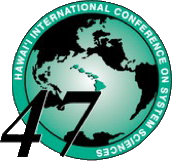Policies & Governance for the Network Society Minitrack

Co-chairs
Peter Parycek (Primary Contact)
Donau-Universität Krems
Department Governance & Public Administration
Zentrum für E-Government
Trakt H, 2nd floor, room 2.42
Dr.-Karl-Dorrek-Straße 30
A-3500 Krems, Austria
Phone: +43-2732 893-2312
Fax: +43-2732 893-4300
E-Mail: peter.parycek@donau-uni.ac.at
Frank Bannister
School of Computer Science and Statistics
Trinity College
Dublin 2, Rep. of Ireland
Phone: +353-1-8962186
Fax: +353-1-6770711
Email: Frank.Bannister@tcd.ie
Antonio Cordella
London School of Economics and Political Sciences
Department of Management
Information Systems and Innovation Group
Houghton Street
London WC2A 2AE
United Kingdom
Phone: +44-207-955-6031
Fax: +44-207-955-7385
Email: a.cordella@lse.ac.uk




This minitrack explores the creation and implementation of public policies and laws to support, facilitate, and promote e-Democracy and e-Government and, as well as how these technologies impact and influence governance systems and public institutions towards open government. It will also explore challenges and solutions in emerging models of governance in relation to ICTs, and ethical issues arising in e-governance in the public sector.
Topics and research areas include, but are not limited to:
-
-The role of ICTs in public administration at the local, state, and national and international level
-
-Public policy issues in relation to e-Democracy, e-Government, open government
-
-Legal and ethical implications of the expanding use of ICTs in the public sector
-
-Legal and policy implications of inter-organizational and public/private sector systems for electronic government service delivery
-
-Legal, policy, and ethical implications of government ICT regulation and management
-
-The impact of ICTs on broader ethical issues in public administration and government
-
-Policy and governance challenges arising from public sector ICT deployment in developing countries.
-
-The impact on government set up, roles and responsibilities
-
-Increase of efficiency with e-government and increase of effectiveness with open government
-
-Impact of big and open data on privacy, data protection and transparency of people and in governments
-
-Cases focusing on law, technology and organizational adaptations
-
-Impact of open “x” developments on laws, e.g., data protection law, or copyright law.
More co-chair information:
Peter Parycek, PhD, MSc, is Head of the Center for E-Governance at the Danube University Krems and Chairman of the ministerial expert group “E-Democracy & E-participation” at the Austrian Federal Chancellery. As a lawyer and graduate of the Master's program Telematics, his work is at the intersection of legal policy, social and technological developments. His research and project priorities include eGovernance, eDemocracy and eGovernment. He is responsible for the conference series CeDEM (International Conference for e-Democracy and Open Government, www.donau-uni.ac.at/cedem) and the open access journal JeDEM (eJournal of eDemocracy and Open Government, http://www.jedem.org).
Frank Bannister, PhD, is Head of the Information System Discipline in Trinity College, Dublin/Ireland. His research interests are e-government, e-democracy and on-line privacy and trust, particularly as they relate to ICT in the public sector. He is co-convener of the permanent study on e-government in the European Group for Public Administration and editor of the Electronic Journal of e-Government. Frank is a fellow of the university, a fellow of the Irish Computer Society, and a Chartered Engineer.
Antonio Cordella, PhD, is a lecturer in the Information Systems and Innovation Group at the Department of Management at the at the London School of Economics. His current research focuses on ICT in the Public Sector, with specific attention to e-government and the associated institutional changes. He holds an undergraduate degree in Political Science from the University of Bologna/Italy and a PhD in Information Systems from the University of Gothenburg/Sweden.

“The Foundations of Innovation in Government Must Rest on Sound Policies, Governance Principles, Ethics, and Laws”






